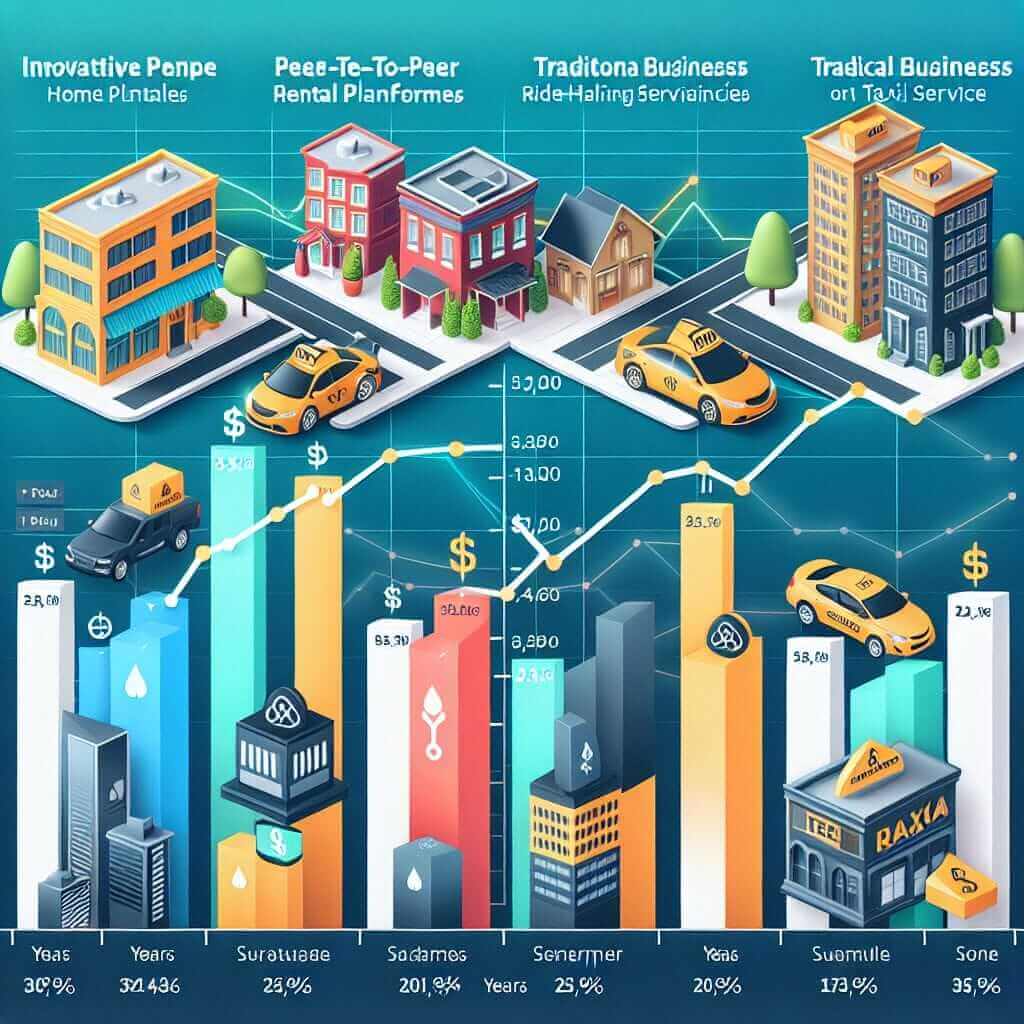The IELTS Reading section assesses various reading skills, essential for university study or professional life. As the sharing economy continues to grow, its economic impacts on traditional businesses have become a popular topic. This article explores the economic impacts of the sharing economy on traditional businesses through a comprehensive IELTS Reading practice test. The practice test simulates real IELTS conditions and helps candidates familiarize themselves with the exam format.
Background of the Topic
The sharing economy, also known as collaborative consumption, has significantly disrupted traditional business models across various industries, from transportation and hospitality to retail and services. Understanding this topic’s relevance can help candidates better anticipate similar questions in the exam.
IELTS Reading Practice Test
Below is a sample IELTS Reading passage with questions and answers based on the topic, “What are the economic impacts of the sharing economy on traditional businesses?” This practice test is designed to represent Medium Text difficulty.
Text: The Sharing Economy and Its Impact on Traditional Businesses
The sharing economy has rapidly emerged as a significant economic force, posing both opportunities and challenges to traditional businesses. Companies like Airbnb, Uber, and TaskRabbit exemplify this new model of economic activity, where individuals can lend or share their resources with others, often via online platforms.
These new business models disrupt traditional businesses in several ways. Firstly, they introduce a high level of competitive pricing. For example, Airbnb allows property owners to rent out their homes at competitive rates, often undercutting established hotels and motels. This competitive pricing puts pressure on traditional businesses to lower their prices, affecting their profit margins.
Moreover, the sharing economy promotes better resource utilization. For instance, ride-sharing services like Uber and Lyft enable car owners to maximize the use of their vehicles, turning what was previously an underutilized resource into a revenue generator. This efficient use of resources contrasts sharply with the traditional taxi industry, which relies on a fixed number of vehicles and drivers.
The flexibility and convenience of sharing economy platforms also attract consumers, who appreciate the ease of access and personalized services. However, this flexibility comes at the cost of regulatory challenges. Traditional businesses are often subject to stringent regulations that do not necessarily apply to sharing economy enterprises, leading to a potential imbalance in the competitive environment.
Despite these challenges, the sharing economy also offers opportunities for traditional businesses to innovate. By adopting some of the core principles of the sharing economy, such as digital platforms for customer engagement and flexible services, traditional businesses can enhance their competitiveness and sustainability.
Questions
Multiple Choice
- According to the passage, which of the following is NOT an example of a sharing economy company?
A) Airbnb
B) Uber
C) Marriott Hotels
D) TaskRabbit
True/False/Not Given
-
The sharing economy negatively impacts all traditional businesses.
-
Ride-sharing services utilize resources more efficiently than traditional taxi services.
Matching Headings
- Match the following headings to the paragraphs:
i. Efficiency in Resource Utilization
ii. Competitive Pricing and Profit Margins
iii. Regulatory Challenges
iv. Opportunities for Traditional Businesses
Answer Keys and Explanations
-
C) Marriott Hotels
- Explanation: Marriott Hotels is a traditional hotel chain, not a sharing economy company.
-
False
- Explanation: The passage mentions both challenges and opportunities for traditional businesses, indicating that the impact is not entirely negative.
-
True
- Explanation: The passage states that ride-sharing services maximize the use of vehicles, contrasting with the traditional taxi industry.
-
i. Better Resource Utilization (Paragraph 2), ii. Competitive Pricing (Paragraph 1), iii. Regulatory Challenges (Paragraph 3), iv. Opportunities (Paragraph 4)
Common Mistakes
-
Misinterpreting General Ideas: Many candidates may generalize the impacts discussed in the passage. Focus on specific mentions of effects on traditional businesses.
-
Overlooking Keyword Synonyms: Pay attention to synonyms and paraphrases in the passage and questions, as they often hold the clues to the correct answers.
Vocabulary
- Disrupt (v) /dɪsˈrʌpt/: to interrupt the usual course of something.
- Underutilized (adj) /ˌʌn.dəˈjuː.təl.aɪzd/: not used to full potential.
- Margins (n) /ˈmɑː.dʒɪnz/: the difference between the cost and the selling price.
Grammar
- Comparative Structures: Often used to highlight differences, such as “more efficient” or “better resource utilization”. Example: “Ride-sharing services utilize resources more efficiently than traditional taxis.”
Tips for High Reading Scores
- Skimming and Scanning: Quickly skim the passage for the main ideas and scan for keywords related to the questions.
- Practice Regularly: The more you practice, the more familiar you become with the format and types of questions.
- Time Management: Allocate time wisely for each section to ensure you can answer all the questions.

By thoroughly understanding the structure and content of the IELTS Reading section, candidates can better prepare to tackle similar topics, achieving higher scores and improving their overall English proficiency.